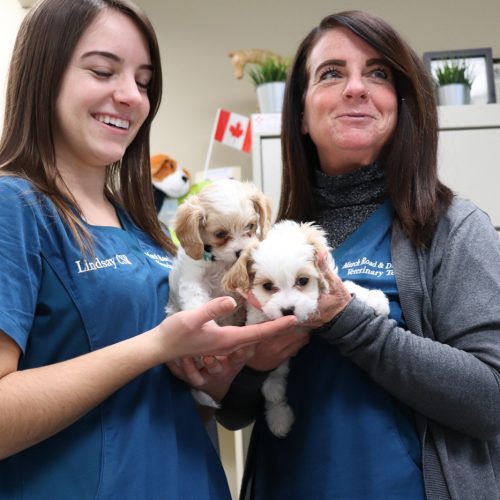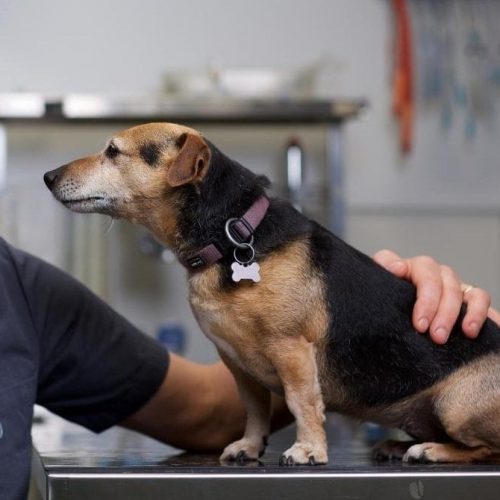Whether it be a brand new 8 week Maine Coon or a greying 12 year old Labrador Retriever, the age of your pet matters when it comes to their health care. Puppies and kittens are no doubt a rewarding addition, but it takes a lot of responsibility, care, and time to get them started on the right path to a long and healthy life. Those same animals will eventually mature and enter their elderly years which brings entirely different requirements to ensure they age well and maintain comfort as senior citizens. Regardless of age, we are here to help.
Puppies
Congratulations on your new puppy! Thank you for choosing us to help protect and care for the new addition to your family. There are many factors to consider when acquiring a new puppy including socialization, house training, nutrition, spaying/neutering, and training. The first few months are a critical period in your puppy’s development, and we can give you the support and tools necessary to help them grow into a well-mannered healthy dog.
Vaccination is paramount at a young age for puppies, as many common bacteria and viruses can easily cause illness. Most of these pathogens can cause serious disease but they are also preventable. Our vaccine protocol for puppies is to first start the series at 8 weeks, then booster the vaccines at 12 and 16 weeks. The main pathogens we account for are rabies, distemper, parainfluenza, adenovirus, parvovirus, lyme, leptospirosis, and bordetella. For puppies particularity, by far the most important vaccine they receive at a young age is for parvovirus, which can cause profuse diarrhea, dehydration, immunosuppression, and is often fatal. The importance of vaccination cannot be stressed enough for pups.
Puppies can come with worms. They commonly acquire roundworms and hookworms from their mothers milk and they are also transmitted through the placenta in utero. Intestinal worms that can cause vomiting, diarrhea, and other gastrointestinal signs (although dogs can have worms without showing any symptoms). It is important for puppies to be tested and treated, not only to rid them of the infection but also to prevent you and the rest of your family from becoming infected, as some worms are zoonotic and can be passed humans. Please remember to bring a fresh stool sample to your first visit for testing.
- At your series of puppy appointments, there are a number of things that will be discussed. Education is the key to starting these animals onto the path of success. Topics discussed include:
- Socialization, Deworming
- House training Behavioural and crate training
- Microchipping, Spay/Neutering
- Nutrition, Emergencies
- Insurance, Outdoor safety and leash walking
- Vaccination, Oral care and toothbrushing
- Safe toys and chewing item, Common pitfalls
- Puppy house-proofing, Parasites
Kittens
Kittens care is very similar to puppy care when it comes to most areas. Kittens are often much easier to raise as they potty train themselves and do not require to be taken for walks three times a day. However, they still need to have considerable effort on your part to ensure they are off to a good start. Just like puppies, kittens also need proper vaccination, deworming, training, proper nutrition, and socialization.
Vaccination is paramount at a young age for kittens, as many viruses can easily cause illness at a young age. Most of these pathogens can cause serious disease, but they are also preventable. Our vaccine protocol for kittens is to first start the series at 8 weeks, then booster the vaccines at 12 and 16 weeks. The main pathogens we account for are rabies, feline rhinotracheitis, calicivirus, panleukopenia, and if your kitten is to be an outdoor cat then they would be at risk for feline leukemia as well.
- At your series of kitten appointments, there is a number of things that will be discussed. Just like with puppies, education is the key to starting these animals onto the path of success. Topics discussed include:
- Socialization, Deworming
- Behavioural modification, Microchipping
- Spay/Neutering, Nutrition
- Emergencies, Insurance
- Vaccination, Oral care
- Outdoor safety and roaming, Leash walking (yes leash walking)
- Safe toys and scratching posts/tower, Common pitfalls
- Kitten house-proofing (especially wiring), Parasites
Seniors
Senior status varies depending on your pet’s breed and size. Smaller dogs tend to live longer than larger dogs, and cats generally live longer than dogs. We can help you determine what life stage your pet is in. Beginning at around age 7-9, pets enter their golden years where they often need more attention and special care. They commonly experience gradual changes that are remarkably like those of aging humans: hair can turn grey, their bodies are not as supple and reflexes are not as sharp as they once were. Hearing, eyesight, and the sense of smell may deteriorate. Energy levels and attention spans seem to diminish and pets start to have a tendency to sleep longer and more soundly.
We can help your pet remain fit and healthy as he or she ages and help us catch any potential problems earlier. The risks of arthritis, cancer, diabetes, heart disease, hormone disorders, and kidney and liver problems all increase with age. In addition, dogs and cats may not show any signs of even serious diseases until they are advanced. Early detection and prompt treatment of these diseases can significantly prolong and improve your pet’s quality of life.
We recommend yearly regular veterinary exams for senior pets. We can treat many symptoms that are commonly attributed to age, including those associated with cognitive dysfunction syndrome (similar to Alzheimer’s in humans). We can also improve your pet’s quality of life in many ways: by identifying and preventing or reducing pain, recommending a nutrition and exercise plan, and suggesting environmental modifications. We tailor senior plans based on your pet’s individual needs. From regular geriatric bloodwork to arthritis control, each pet has needs that differ. We can help and control and maintain those needs to help them stay as comfortable and healthy as possible. Allowing our pets to age gracefully is a service we owe them after sharing their best years with us.






